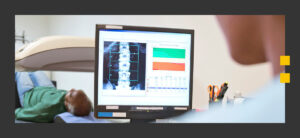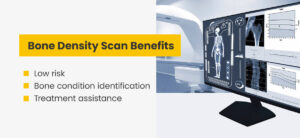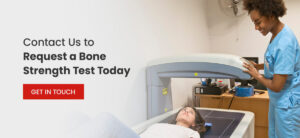
Your bone density can decrease as you get older, increasing your risk of developing osteoporosis. A bone density test can help your health care provider determine your bone strength.
The results can diagnose osteoporosis or determine your chance of developing this condition. Your doctor can assess your risk of future bone breaks and fractures, then respond with an appropriate care plan. Even if your test results reveal good bone health, they can serve as a baseline measurement for future testing.
You may have questions about bone density scans if you've never experienced one. What is the meaning of a DEXA scan? What are bone density tests used for? Learn more about the procedure and its benefits in this guide.
What Is a Bone Density Scan?
A dual-energy X-ray absorptiometry (DEXA), also called a bone density scan, measures calcium and other minerals in your bones. During this procedure, a radiologist aims two X-ray beams with different energy levels at the bones. Bone and soft tissue absorb some of the radiation, while some radiation travels through your body.
The soft tissue absorption of each beam allows the radiologist to determine your bone mineral density (BMD), strength and thickness. DEXA machine detectors measure how much radiation passes through your bones, sending this data to a computer. A doctor will compare your bone density measurements with those of a healthy person your own age, ethnicity and gender.
DEXA is the most widely used BMD measurement technology. It's quick, painless, noninvasive and generally more effective than traditional X-ray scans in identifying low bone density.
Osteoporosis and Bone Tests
DEXA is typically used to diagnose and track osteoporosis, a medical condition where the bones become weak and brittle due to tissue loss, usually from vitamin deficiencies or hormonal changes. Osteoporosis makes the bones more susceptible to breaks and fractures.
A bone strength test can also serve the following purposes:
- Diagnosing osteopenia
- Predicting the risk of future fractures
- Determining if osteoporosis treatment is working
Why Get a Bone Density Test?
It's not uncommon for your bones to become thin and fragile as you age. However, extremely thin bones indicate osteopenia, which increases your risk of developing osteoporosis.
Women aged 65 and older and men over the age of 70 are recommended to get a DEXA scan, as they are at high risk of bone density loss and osteoporosis. While osteoporosis can occur at any age, postmenopausal women are especially vulnerable. Estrogen levels decline during menopause, which can lower bone density. Some other risk factors for low bone density include:
- One or more fractures after the age of 50
- A half inch or more of lost height within one year
- Low body weight
- Smoking and consuming excessive amounts of alcohol
- Poor diet and calcium and vitamin deficiencies
- Hormone changes from menopause or smoking
- Sedentary lifestyle
- Family history of osteoporosis
- Medical conditions like kidney disease, rheumatoid arthritis, celiac sprue, myeloma and overactive parathyroid gland
- Certain medications like hormone blockers and glucocorticoids
Bone Density Scan Benefits
The main benefits of bone testing include:

- Low risk: A bone density test uses lower radiation doses than traditional X-rays, making it safe for most patients and requiring no recovery time. However, DEXA scans aren't recommended for pregnant women, as even minimal radiation may pose risks to an unborn baby.
- Bone condition identification: Unlike standard X-rays, A DEXA scan can identify small bone density reductions. This makes it possible for doctors to diagnose early-stage osteoporosis, helping reduce the chance of future fractures and disability.
- Treatment assistance: A DEXA scan is a simple and reliable way to diagnose osteoporosis and other bone conditions. Doctors can use the test results to determine the proper treatment method and monitor the condition.
Who Does Bone Density Tests?
A DEXA scan typically takes place in a radiologist's office. Before the procedure, they'll ask you to remove any metal jewelry or clothing with metal components, like buckles or buttons.
You'll lie on your back on a padded table while a scanning machine passes over your hip and lower spine. Simultaneously, a photon generator scanning machine will pass below you. You'll need to remain completely still, and you may even be asked to hold your breath during the scan.
The images produced from both machines are then combined and sent to a computer. The radiologist will examine the photos on the computer screen. When measuring bone density in a smaller region, such as your hand, finger, forearm or foot, the radiologist may use a portable scanner called a peripheral DEXA (p-DEXA).
DEXA Scan Results
Bone density test results are usually measured in T-scores. A T-score compares your bone density levels with those of an average young person with healthy bones. A low T-score can indicate some bone loss. Here are the results of a DEXA scan and what they typically mean:
- A T-score of -1.0 or higher is a healthy bone density.
- A T-score between -1.0 and -2.5 signifies osteopenia.
- A T-score of -2.5 or less usually means you have osteoporosis.
If your T-score suggests you have low bone density, your doctor can proceed with a treatment plan accordingly. Osteoporosis is nonreversible, but certain practices can help strengthen bones and prevent further bone loss. Your doctor may recommend lifestyle changes such as:
- Prescription medications to increase bone density
- More vitamin D and calcium in your diet
- Physical activity such as lifting weights, walking, jogging, dancing, jumping rope, climbing stairs or playing tennis
Bone Density Testing in South Florida
If you're seeking a bone density scan in South Florida, look no further than Impression Imaging. We're passionate about delivering exceptional service and innovative technology to every patient. Our world-class medical team strives to provide the most personalized care and superior responsiveness.
Our advanced imaging techniques allow us to give patients accurate assessments to address their conditions. From highly skilled technicians to state-of-the-art scanning equipment, we can provide high-quality imaging capabilities to identify the root of your bone health concerns.
We typically complete reports within 12-24 hours, helping you and your doctors receive critical information as quickly as possible. Our radiologists strive to simplify the process for all parties, working closely with your doctors and ensuring consistent communication. We can also provide complimentary, private transportation for patients that need it.
When you choose Impression Imaging of South Florida for bone density testing, you'll receive compassionate care and accurate information to assist your treatment needs.
Contact Us to Request a Bone Strength Test Today
Impression Imaging is the place to turn when you need a trusted medical imaging center in South Florida. We always put the patient's needs first, providing a smooth, relaxing and comfortable experience.
Whatever reason you might require a bone density scan, our radiologists can obtain the efficient results your doctor needs to proceed with the appropriate treatment course. Send us a message or call 954-580-2780 to request an appointment!



